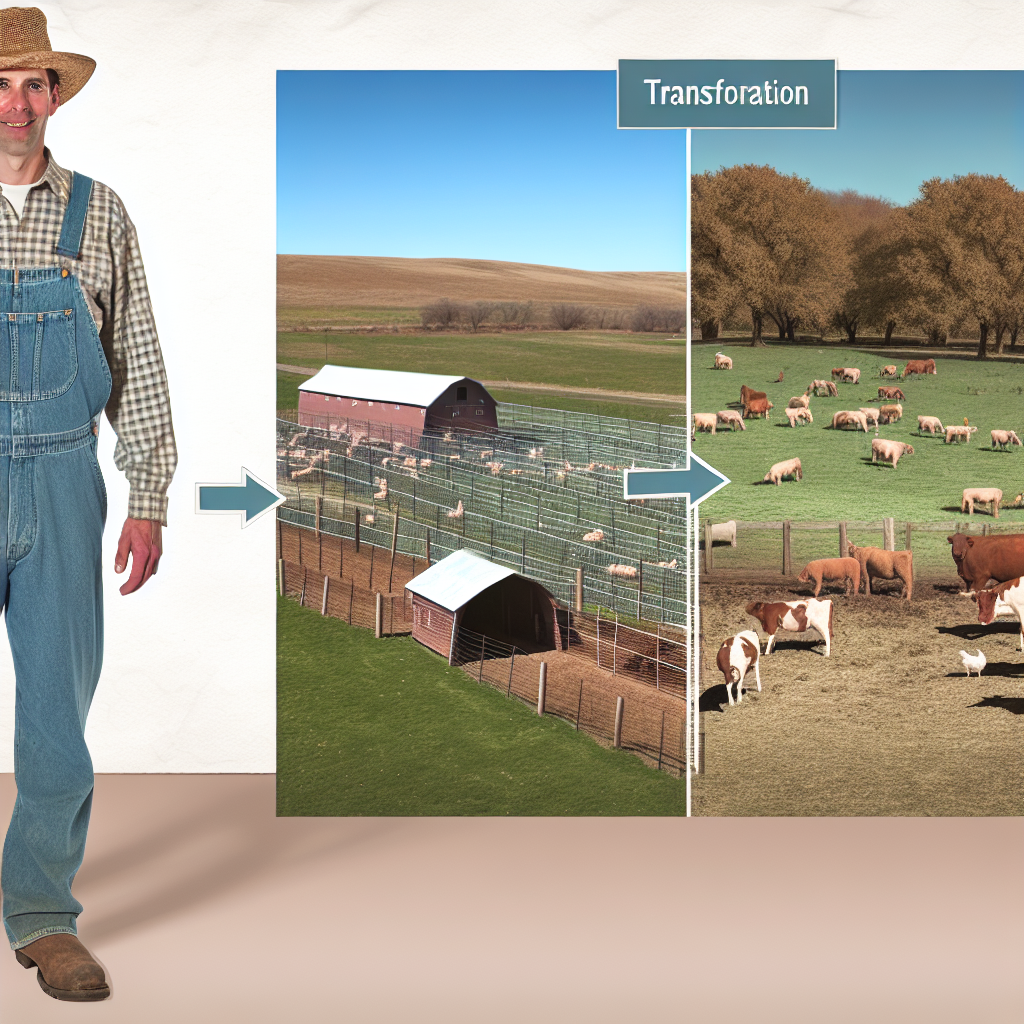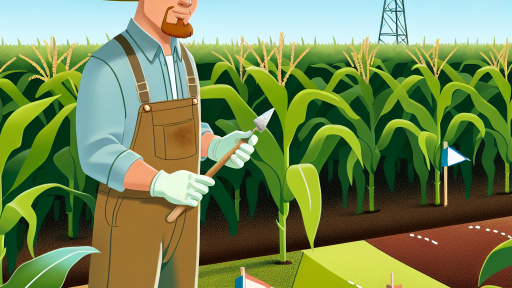Introduction to Ethical Animal Farming
Ethical animal farming refers to practices that prioritize animal welfare.
This approach aims to create humane and sustainable conditions for livestock.
It contrasts significantly with conventional farming methods.
Moreover, ethical farming encourages transparency and accountability in the food industry.
Definition of Ethical Animal Farming
Ethical animal farming embodies a commitment to treating animals with respect.
It includes adequate space, proper medical care, and a natural diet.
Farmers who practice this approach avoid cruel practices like confinement.
Instead, they focus on allowing animals to engage in natural behaviors.
Ultimately, this farming style respects the rights of animals.
Importance of Ethical Animal Farming
Ethical animal farming plays a crucial role in promoting animal welfare.
Additionally, it supports healthier food choices for consumers.
Furthermore, this practice can enhance environmental sustainability.
It reduces the negative impacts often associated with industrial farming.
This approach also strengthens community ties by fostering local farming.
Historical Context: Evolution of Animal Farming Practices
Early Practices
Animal farming began thousands of years ago in ancient civilizations.
Transform Your Agribusiness
Unlock your farm's potential with expert advice tailored to your needs. Get actionable steps that drive real results.
Get StartedFarmers domesticated animals for companionship and labor.
Initially, animals provided essential resources like meat, milk, and wool.
Advancements in Methods
Over time, advancements in farming methods emerged.
Technological innovations revolutionized the way farmers raised animals.
For example, the invention of the plow improved crop production.
As a result, farmers could support larger herds.
Industrialization of Animal Farming
The 20th century marked the industrialization of animal farming.
Factory farming practices became prevalent during this time.
Farmers raised animals in confined spaces for maximum efficiency.
This shift prioritized production over animal welfare.
Rise of Awareness and Advocacy
In response to industrial practices, awareness began to rise.
Advocates highlighted the negative impacts of factory farming.
Animal rights organizations campaigned for better treatment of animals.
Consequently, more consumers demanded ethical farming practices.
Transition to Ethical Animal Farming
Today, many farmers are transitioning to ethical animal farming.
These practices prioritize humane treatment and sustainable methods.
Farmers understand the importance of animal welfare.
As a result, consumers increasingly support farms that align with these values.
Key Principles of Ethical Farming
Animal Welfare
Animal welfare is crucial in ethical farming practices.
Farm animals deserve to live free from pain and suffering.
Providing adequate space allows them to express natural behaviors.
Furthermore, a balanced diet ensures their health and well-being.
Farmers must prioritize humane treatment in their operations.
Education and training play a significant role in this commitment.
Showcase Your Farming Business
Publish your professional farming services profile on our blog for a one-time fee of $200 and reach a dedicated audience of farmers and agribusiness owners.
Publish Your ProfileWorkers should understand the needs of different species.
Sustainability
Sustainable farming practices are essential for the environment.
These methods reduce resource depletion and soil degradation.
Crop rotation enhances soil fertility and prevents erosion.
Conservation techniques protect local ecosystems from harm.
Additionally, farmers can utilize renewable energy sources.
Integrating technologies can minimize waste and pollution.
Ultimately, sustainability supports long-term agricultural viability.
Community Engagement
Community engagement fosters local support and understanding.
Farmers should connect with consumers to share their practices.
Transparency builds trust and encourages informed choices.
Furthermore, collaborating with local organizations can enhance education.
Farmers can participate in community events to showcase their commitment.
Involving community members enriches the farming experience.
Economic Viability
Ethical animal farming must also remain economically viable.
Smart investments can yield sustainable profits over time.
Efficient operations reduce costs and enhance productivity.
Investing in technology can streamline processes and save resources.
Consumers are increasingly willing to pay for ethically sourced products.
Finally, finding markets for these products boosts local economies.
Uncover the Details: Building Strong CSA Relationships with Customers
Transition Strategies: Assessment of Current Practices and Identification of Goals
Understanding Current Practices
Farmers need to evaluate their existing animal farming methods.
This assessment helps identify areas for improvement.
Start by gathering data on animal welfare and environmental impact.
Identifying Ethical Goals
Setting clear goals is essential for successful transition.
These goals should focus on improving animal welfare standards.
Moreover, reducing environmental harm must be a priority.
Evaluating Economic Viability
Economic factors play a crucial role in the transition.
Farmers should analyze their financial situation before making changes.
Assessing market demand for ethically raised products is necessary.
Engaging Stakeholders
Involving stakeholders ensures a smoother transition process.
Farmers should communicate with consumers about their goals.
Additionally, collaborating with local organizations can provide support.
Creating an Action Plan
Developing an action plan is vital for effective implementation.
This plan should outline specific strategies for achieving goals.
It must include timelines and measurable outcomes for progress tracking.
Gain More Insights: Ethical Farming Certifications Explained
Consumer Awareness and Demand: The Role of Public Perception in Ethical Farming
Understanding Consumer Preferences
Consumer preferences significantly impact the agricultural landscape.
Today, more individuals prioritize ethical treatment of animals.
This growing interest drives a shift toward ethical farming practices.
Showcase Your Farming Business
Publish your professional farming services profile on our blog for a one-time fee of $200 and reach a dedicated audience of farmers and agribusiness owners.
Publish Your ProfileMoreover, informed consumers actively seek out cruelty-free products.
The Rise of Ethical Consumption
Ethical consumption has gained traction in recent years.
Many shoppers now consider the welfare of animals in their purchasing decisions.
This shift influences companies to adopt better practices.
As a result, brands that prioritize ethics often enjoy increased loyalty.
The Impact of Education and Awareness Campaigns
Education plays a crucial role in shaping consumer behavior.
Awareness campaigns highlight the benefits of ethical farming methods.
Initiatives like the “Meatless Monday” encourage plant-based diets.
Such movements promote discussions around animal welfare.
Social Media and Its Influence
Social media platforms amplify consumer voices effectively.
Influencers share messages about sustainable and ethical farming.
This connectivity fosters a community dedicated to promoting change.
Furthermore, consumers are increasingly vocal about their values online.
Case Studies of Successful Ethical Brands
Several brands exemplify the importance of consumer awareness.
For instance, Harvest Moon Farm expanded its organic offerings.
Their practices resonate with ethically-minded consumers.
Similarly, Green Pastures Dairy promotes regenerative farming techniques.
The Role of Certifications
Certifications enhance consumer trust in ethical claims.
Labels like “Certified Humane” provide transparency.
Consumers often rely on these credentials when making choices.
Ultimately, certifications help solidify the credibility of brands.
The Future of Ethical Farming
Public perception will continue to shape the future of farming.
As more consumers demand ethical options, the market will evolve.
This trend promises to create a more sustainable agricultural system.
In light of this, ongoing consumer education remains vital.
Gain More Insights: Advantages Of Ethical Livestock Farming
Policy Changes and Regulations
Government Support for Ethical Practices
Government policies play a crucial role in promoting ethical animal farming.
They establish regulations that protect animal welfare standards.
Additionally, these policies help create incentives for farmers.
For instance, subsidies can encourage the adoption of sustainable practices.
Moreover, grants are available for transitioning operations to humane methods.
Governments should enforce strict penalties for unethical farming practices.
This enforcement maintains accountability across the industry.
Furthermore, education initiatives can inform farmers about ethical practices.
These initiatives help raise awareness and promote responsible farming.
Impact of Legislation on Farming Practices
Recent legislation significantly impacts farming methods used today.
For example, laws regulating space requirements enhance animal living conditions.
They ensure that animals have adequate room to move and express natural behaviors.
In addition, legislation banning certain harmful practices fosters better welfare.
These changes benefit not just animals but also farmers and consumers alike.
Showcase Your Farming Business
Publish your professional farming services profile on our blog for a one-time fee of $200 and reach a dedicated audience of farmers and agribusiness owners.
Publish Your ProfileConsumers increasingly demand ethically sourced products.
Thus, compliance with regulations can open new market opportunities.
Collaboration with Non-Governmental Organizations
Partnerships between governments and NGOs support ethical farming initiatives.
Non-governmental organizations offer valuable resources and expertise.
They assist farmers in implementing best practices for animal welfare.
Moreover, joint campaigns raise public awareness about ethical farming benefits.
Such collaborations can effectively change consumer perceptions.
Consequently, more consumers may choose to support ethical farming practices.
Find Out More: Raising Animals Ethically On Farms

Case Studies: Successful Transitions to Ethical Animal Farming
Sunny Acres Farm
Sunny Acres Farm made a significant shift to ethical farming practices.
Initially, they focused on conventional animal husbandry methods.
After attending a sustainability workshop, they realized the need for change.
As a result, they adopted rotational grazing techniques.
This method improved soil health and animal welfare.
Also, they increased their pastureland for better livestock movement.
They reported a noticeable increase in animal happiness and health.
Ultimately, their profits rose due to better product quality.
Green Valley Ranch
Green Valley Ranch transitioned to ethical animal farming after facing public pressure.
The community demanded humane treatment of livestock.
In response, the ranch implemented new animal welfare guidelines.
They invested in better housing for their animals, promoting natural behaviors.
Consequently, their production levels remained stable during the transition.
They also diversified their operations by introducing organic produce.
Through effective marketing, they attracted conscious consumers.
This change enhanced their reputation within the community.
Peaceful Pastures Farm
Peaceful Pastures Farm represents a model of successful ethical transition.
The owners were inspired by a documentary on factory farming.
This motivated them to switch to free-range animal practices.
They sought guidance from ethical farming organizations.
The farm now features spacious outdoor areas for their livestock.
Simultaneously, they prioritize environmental sustainability.
They have implemented water conservation strategies on the property.
This approach has garnered positive media attention and consumer support.
Red Earth Organic Farms
Red Earth Organic Farms focused on holistic practices in their farming approach.
They combined crop and livestock production in their regenerative strategy.
This system improved nutrient cycling and soil health.
They also provided educational workshops for neighboring farmers.
This fostered community interest in ethical animal farming.
Moreover, their products received organic certification, boosting market appeal.
As a result, they experienced a surge in sales and local partnerships.
Showcase Your Farming Business
Publish your professional farming services profile on our blog for a one-time fee of $200 and reach a dedicated audience of farmers and agribusiness owners.
Publish Your ProfileThe farm continues to inspire others to pursue sustainable methods.
Challenges and Barriers
Economic Hurdles
Transitioning to ethical animal farming involves significant initial investments.
Farmers often face high costs for upgrading facilities.
Additionally, purchasing organic feed can strain budgets.
Moreover, ethical farming practices may result in lower immediate profits.
Consumers may resist paying higher prices for ethically sourced products.
Logistical Hurdles
Logistics pose a significant challenge in ethical animal farming.
Infrastructure for processing and distribution may be inadequate.
Farmers often struggle to find suppliers of ethical resources.
Furthermore, transportation logistics can become complex and costly.
Compliance with new regulations can further complicate operations.
Market Acceptance
Market acceptance of ethically farmed products remains a challenge.
Educating consumers about the benefits of ethical farming is crucial.
Many consumers continue to prefer cheaper, conventionally farmed options.
Additionally, large companies can overshadow smaller ethical farms.
Building a loyal customer base requires time and effort.
Regulatory Issues
Navigating regulations can be cumbersome for farmers.
Regulatory requirements may vary significantly by location.
Farmers may find it difficult to comply with stringent standards.
Moreover, inconsistent policies can lead to confusion and frustration.
Engaging with local governments can help in addressing these hurdles.
Future of Food: The Role of Technological Innovations in Ethical Farming
Embracing Technology for Animal Welfare
Technological innovations significantly enhance animal welfare standards.
Farmers utilize monitoring devices to track livestock health in real-time.
Moreover, these technologies reduce stress and improve living conditions.
For instance, automated feeding systems ensure proper nutrition.
Similarly, climate control technologies help maintain ideal environments.
Precision Agriculture Technologies
Precision agriculture promotes efficient resource use in farming.
Farmers benefit from mapping technologies for land management.
This approach optimizes water usage and minimizes waste.
Furthermore, crop monitoring systems help identify issues early.
As a result, farmers can address problems quickly and effectively.
Data-Driven Decision Making
Data analytics empowers farmers to make informed decisions.
Real-time data collection helps ensure livestock health and productivity.
Farmers analyze performance metrics to adjust their practices.
This process enhances operational efficiency and sustainability.
Ultimately, data-driven approaches lead to better animal welfare outcomes.
Advancements in Sustainable Practices
Innovations contribute to sustainable farming practices.
For example, regenerative agriculture techniques restore soil health.
These methods promote biodiversity and combat climate change.
As a result, farmers produce food with a lower environmental impact.
Showcase Your Farming Business
Publish your professional farming services profile on our blog for a one-time fee of $200 and reach a dedicated audience of farmers and agribusiness owners.
Publish Your ProfileAdditionally, sustainable practices ensure future food security.
Integrating AI and Robotics
Artificial intelligence and robotics revolutionize farming operations.
Robots assist in daily tasks, saving farmers time and effort.
AI systems help predict disease outbreaks and manage resources.
Consequently, farmers can focus on enhancing animal care and productivity.
This integration results in a more ethical approach to farming.
The Path Forward for Farmers, Consumers, and Policymakers
Collaborative Efforts
Farmers, consumers, and policymakers must work together actively.
This collaboration will foster a robust ethical farming ecosystem.
Farmers should innovate their practices to improve animal welfare.
Consumers need to advocate for transparent supply chains.
Policymakers must establish clear regulations that guide ethical practices.
Consumer Education
Empowering consumers to make informed choices is essential.
Education campaigns should promote ethical farming benefits.
Additionally, consumers should be aware of certification labels.
Well-informed consumers can drive demand for humane products.
Supporting Local Farmers
Local farmers play a crucial role in sustainable food systems.
Supporting them can strengthen community bonds.
Buying local reduces the carbon footprint associated with transportation.
Moreover, it encourages ethical practices in your region.
Policy Reforms
Policymakers must prioritize policies that protect animal welfare.
Incentives for farmers to transition to ethical practices are vital.
Furthermore, stricter regulations can prevent abusive methods.
These reforms should be crafted in consultation with all stakeholders.
Future Innovations
Technological advances can significantly enhance farming practices.
Investing in research can lead to better animal husbandry techniques.
Moreover, innovations can make ethical farming more economically viable.
Farmers should embrace technology to increase efficiency sustainably.
A Call to Action
All parties must commit to this critical transition.
Farmers can lead by example with responsible practices.
Consumers can make conscious purchasing decisions.
Policymakers can create an environment that supports change.
By working together, we can shape a more ethical future.




